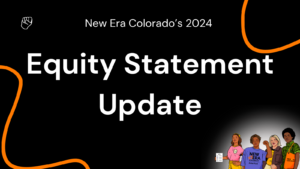Recruitment, Hiring, and Interview Processes
In 2024, we implemented new hiring practices in order to diversify our team including using job boards that specifically target Black and brown applicants and relying more on connector outreach to recruit candidates. Our interview questions explicitly ask about commitment to anti-racism and equity with ranging levels of proficiency required for different positions. Currently, 50% of our permanent staff identify as people of color which was shy of our goal of 55%, so we have more work to meet our goals. We also emphasized diversity in recruiting our seasonal canvassing team and internship program, with 50% of our seasonal staff identifying as people of color. Focusing on connector outreach and 1:1 recruitment was very successful this year and we’ll keep honing that strategy for hiring.
We know that diversifying our team is just the first step toward an inclusive community. That’s why our other organizational policies aim to create a welcoming community that supports people of color once they are on board.
Anti-Racist Learning
All white permanent staff members continue to attend the intensive, multi-week long Facing Racism series with Soul 2 Soul Sisters per our original statement. Our white caucus meets regularly to continue our learning around whiteness, privilege, allyship, and intersectionality. This year, the white caucus read the book American Whitelash: A Changing Nation and the Cost of Progress by Wesley Lowery as part of our ongoing learning.
The people of color caucus meets regularly to build community, inform organizational decisions, and foster healing. The POC caucus held a post-election retreat focused on healing, rest, and relationship building to support in dealing with the presidential election results.
We continued our work with Regan Byrd, LLC on transformative justice as an approach to conflict management. We participated in several workshops to learn the principles and practices of transformative justice, resulting in a new conflict policy and harm reduction flowchart rooted in abolitionist principles. We are now implementing that framework and working to see conflict as generative and address interpersonal conflict in a healthy way. We know this work requires grappling with trauma, bias, and societal aversions to conflict that we will need to continue to unpack and work toward. We also worked with Barbara Bonner and Enid Carlson on our own conflict styles and how to approach conflict in a self-aware and trauma-informed manner.
Equity Committee
Our equity committee, FREE, continues to meet regularly and hold the organization accountable to its equity goals. The latest iteration of the committee focused on the transformative justice project with Regan and served as a consultant for team members who needed to grapple with equity challenges. The committee will now renew membership in 2025.
Collective Bargaining Agreement
Thanks to our collective commitment to transformative justice, we came into the renegotiation of our collective bargaining agreement with those principles in mind: assuming best intentions, understanding perspectives, and finding a path forward. We are pleased to share that we have a tentative agreement for our new contract that includes increased pay by 7%, more holidays, $150 more in professional development funds, 3% raises for bilingual employees, and increased technology stipends. When our staff salaries and benefits are more competitive, that means higher recruitment and retention for staff of color.
Rapid Response
This year, we grappled with the shortcomings of our rapid response protocol as an organization and how it limited our ability to express solidarity in moments of crisis or oppression outside of our organizational influence. With the support of the POC caucus, we have revised our rapid response protocol to better tier out responses so that we can manage capacity while also expressing solidarity for impacted communities during traumatic events. This protocol will be put to the test as we prepare for an onslaught of rapid response moments with the coming administration and we will have to figure out the balance between protecting our capacity to do our work and also the importance of showing our values to our base and sticking up for the most marginalized communities.
